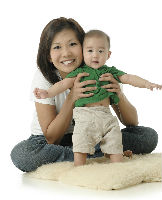When Should Babies Walk?
Many new parents want to know when they can expect their baby to start walking. It can be both exciting and worrisome anticipating your baby’s first steps. However, don’t get too caught up in the numbers. Developmentally normal babies can start walking as early as 9 months or as late as 16 months. There are many factors, both physical and temperamental, that impact timing.
Here we’ll share some insights into what factors will impact when your baby starts walking. We also include tips on how to help your baby strut independently.
Muscle Strength, Balance, and Temperament
Around fifty percent of babies are afoot by the time they’re one year old. However, there is a wide normal age range of walking, from nine to sixteen months. When a baby walks is a matter of coordinating three important factors. These factors include muscle strength, balance, and temperament. The latter seems to influence the age that a baby will walk independently the most.  Babies with easier temperaments often approach major developmental milestones more cautiously. Since crawling is speedier than walking anyway, confirmed crawlers are content to zip around on the floor like miniature race cars and show no interest in joining the tall and busy world.
Babies with easier temperaments often approach major developmental milestones more cautiously. Since crawling is speedier than walking anyway, confirmed crawlers are content to zip around on the floor like miniature race cars and show no interest in joining the tall and busy world.
The Late Bloomer
There’s no reason to be concerned if your baby is taking some extra time to graduate from crawling to walking. Late walkers are more likely to be content to entertain themselves with seeing and fingering fun than with motor accomplishments. A late walker goes through the crawl-cruise-stand-walk sequence slowly and cautiously, calculating each step and progressing at his own comfortable rate. When he finally does begin, he walks well.
What To Know If Your Baby Starts Walking Early
On the other hand, the early walker may be the impulsive, motor-driven baby who has raced through each motor milestone before parents could get their camera ready. While there is no definite profile of those that start early baby walking, they tend to be high-need babies who early on left the lap stage and squirmed out of infant seats. Body type may also affect the age of walking. Lean babies tend to be afoot earlier. Early and impulsive walkers are often more accident-prone than their more cautious walking mates.
How Can I Help My Baby Learn to Walk?
Parents often ask, “Will I delay the age that my baby starts walking by carrying her around too much?” The answer to this common question is no. In our experience, and in the studies others have done, babies who are the product of the attachment style of parenting (for example, worn in a baby sling for many hours a day) often show more advanced motor skills. No matter which baby in the neighborhood walks first or wins the speed race, the age of walking has nothing to do with eventual intelligence or motor skills. When and how your baby takes his first steps is as unique as his personality.
For more information on this topic, click here.
For more comprehensive information on child development, see The Sears Baby Book: Everything You Need to Know About Your Baby from Birth to Age Two
Dr. Sears, or Dr. Bill as his “little patients” call him, has been advising busy parents on how to raise healthier families for over 40 years. He received his medical training at Harvard Medical School’s Children’s Hospital in Boston and The Hospital for Sick Children in Toronto, the world’s largest children’s hospital, where he was associate ward chief of the newborn intensive care unit before serving as the chief of pediatrics at Toronto Western Hospital, a teaching hospital of the University of Toronto. He has served as a professor of pediatrics at the University of Toronto, University of South Carolina, University of Southern California School of Medicine, and University of California: Irvine. As a father of 8 children, he coached Little League sports for 20 years, and together with his wife Martha has written more than 40 best-selling books and countless articles on nutrition, parenting, and healthy aging. He serves as a health consultant for magazines, TV, radio and other media, and his AskDrSears.com website is one of the most popular health and parenting sites. Dr. Sears has appeared on over 100 television programs, including 20/20, Good Morning America, Oprah, Today, The View, and Dr. Phil, and was featured on the cover of TIME Magazine in May 2012. He is noted for his science-made-simple-and-fun approach to family health.

